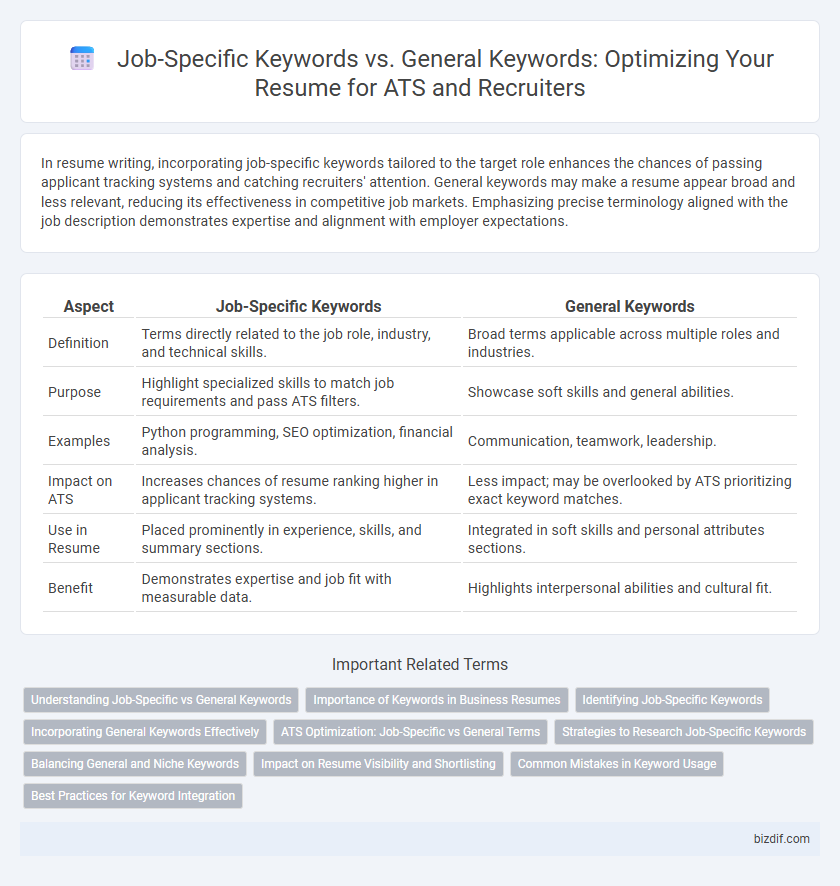In resume writing, incorporating job-specific keywords tailored to the target role enhances the chances of passing applicant tracking systems and catching recruiters' attention. General keywords may make a resume appear broad and less relevant, reducing its effectiveness in competitive job markets. Emphasizing precise terminology aligned with the job description demonstrates expertise and alignment with employer expectations.
Table of Comparison
| Aspect | Job-Specific Keywords | General Keywords |
|---|---|---|
| Definition | Terms directly related to the job role, industry, and technical skills. | Broad terms applicable across multiple roles and industries. |
| Purpose | Highlight specialized skills to match job requirements and pass ATS filters. | Showcase soft skills and general abilities. |
| Examples | Python programming, SEO optimization, financial analysis. | Communication, teamwork, leadership. |
| Impact on ATS | Increases chances of resume ranking higher in applicant tracking systems. | Less impact; may be overlooked by ATS prioritizing exact keyword matches. |
| Use in Resume | Placed prominently in experience, skills, and summary sections. | Integrated in soft skills and personal attributes sections. |
| Benefit | Demonstrates expertise and job fit with measurable data. | Highlights interpersonal abilities and cultural fit. |
Understanding Job-Specific vs General Keywords
Job-specific keywords are tailored to the particular skills, qualifications, and industry jargon relevant to a specific position, enhancing your resume's alignment with Applicant Tracking Systems (ATS). General keywords, such as "teamwork" or "communication," reflect broader soft skills applicable across various roles but carry less weight in ATS ranking compared to job-specific terms. Prioritizing job-specific keywords extracted from the job description increases your resume's relevance and improves visibility to recruiters in competitive job markets.
Importance of Keywords in Business Resumes
Job-specific keywords are essential in business resumes because they directly align with the skills and qualifications sought by employers, improving the chances of passing Applicant Tracking Systems (ATS). General keywords, while helpful, lack the precision needed to highlight unique expertise in areas like finance, marketing, or management. Incorporating targeted terminology relevant to the specific job title and industry enhances resume visibility and demonstrates a clear match to the employer's requirements.
Identifying Job-Specific Keywords
Identifying job-specific keywords involves analyzing the job description to extract terms that directly relate to the required skills, qualifications, and industry jargon, ensuring the resume aligns with the employer's expectations. These keywords often include technical skills, certifications, software names, and role-specific competencies that differentiate candidates within a particular field. Incorporating job-specific keywords improves applicant tracking system (ATS) compatibility and enhances the likelihood of passing initial resume screenings.
Incorporating General Keywords Effectively
Incorporating general keywords effectively in a resume involves integrating broad industry-relevant terms that demonstrate the candidate's overall skills and adaptability, such as "teamwork," "communication," and "problem-solving." These keywords enhance the resume's chances of passing Applicant Tracking Systems (ATS) by aligning with common search criteria used by employers. Balancing general keywords with job-specific terms ensures the resume remains both comprehensive and targeted to the desired role.
ATS Optimization: Job-Specific vs General Terms
Including job-specific keywords tailored to the exact role significantly enhances ATS optimization by matching the precise skills and qualifications sought by employers. General keywords may increase the overall relevance but often dilute the impact, making resumes less likely to pass through ATS filters designed to identify specialized expertise. Prioritizing terms from the job description, such as "data analysis," "project management," or "Java programming," ensures higher visibility and alignment with automated screening systems.
Strategies to Research Job-Specific Keywords
Target job-specific keywords by thoroughly analyzing job descriptions, company websites, and industry-related publications to identify relevant terminology and skills. Use tools like ATS scanners, keyword analyzers, and LinkedIn job postings to extract high-impact phrases tailored to the role. Integrate these keywords naturally in your resume to improve visibility and pass automated screening systems effectively.
Balancing General and Niche Keywords
In resume writing, balancing job-specific keywords with general keywords enhances visibility in applicant tracking systems (ATS) while showcasing relevant skills. Incorporating niche keywords tailored to the industry or position demonstrates expertise and aligns your profile with employer requirements. Using a strategic mix ensures your resume captures broad search terms and detailed competencies, increasing the chances of passing automated screenings and attracting recruiter attention.
Impact on Resume Visibility and Shortlisting
Job-specific keywords significantly enhance resume visibility by aligning closely with applicant tracking systems (ATS) algorithms used by recruiters, increasing the likelihood of passing initial screenings. General keywords, while useful for broad relevance, often dilute focus and reduce the precision of candidate matching, impacting shortlisting negatively. Incorporating targeted industry jargon and role-specific terminology optimizes resume ranking and improves chances of interview calls.
Common Mistakes in Keyword Usage
Job-specific keywords target particular skills, tools, and qualifications relevant to a specific position, while general keywords reflect broader competencies or traits. A common mistake in keyword usage is overloading resumes with generic terms like "team player" or "hardworking," which fail to align with the precise demands of the job description. Ignoring tailored, industry-specific keywords reduces applicant tracking system (ATS) visibility and decreases the chances of passing initial screening stages.
Best Practices for Keyword Integration
Incorporate job-specific keywords by carefully analyzing the job description to align with required skills, tools, and qualifications, enhancing your resume's relevance to applicant tracking systems (ATS). Balance these with general keywords related to industry standards and soft skills to demonstrate both specialized expertise and versatile competencies. Optimize keyword density naturally within accomplishments and experience sections to maintain readability while maximizing searchability.
Job-specific keywords vs General keywords Infographic

 bizdif.com
bizdif.com